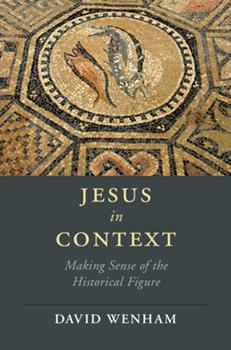Q. As for the Son of Man material I remember Charlie Moule saying that we should not equate the phrase ‘the Son of Man’ with more generic uses of the phrase ‘ben Adam’ etc. not least because the phrase is actually bar enosh, in Aramaic and does not seem to be an allusion to Adam like the phrase ‘a son of humanity’ can be. He argued that the definite article in front of the phrase was retrospective referring to ‘the aforementioned Son of Man’ specifically the one mentioned in Dan. 7.13-14. I think this is likely right, not least because the only OT text that mentions the kingdom of God, an everlasting Kingdom and the one like a Son of Man in the same text is Dan. 7.13-14. It surely cannot be a coincidence that these two phrases Son of Man and Kingdom of God are the ones scholars of all stripes agree Jesus used in his public discourse. If Jesus interpreted his mission and ministry out of Dan. 7.13-14, then one can also understand why he did not interpret it out of 2 Sam. 7— the promise to David of dynastic succession. He would be king then die, then his Son would be king. And so on. But Jesus was not expecting to be that sort of king. He was expecting to be the figure in Dan. 7 who would return to reign forever, and in the meantime was already inaugurating his kingdom during his ministry. Note that when the question of whether Jesus is Son of David or not is raised, Jesus retorts then why do the Psalms (Ps. 110) suggest he is David’s Lord, not merely David’s Son. In other words, normal Jewish messianic thinking and categories are not sufficient. Lastly, note that the high priest does not tear his robes and cry blasphemy because Jesus suggests he is the Anointed One. That was not blasphemy. No the high priest tears his robe because Jesus is claiming to be the Son of Man who will be sitting at the right hand of God and coming on the clouds to judge the earth— including the high priest who thought he had the upper hand in judging Jesus. Does this make sense to you? It would imply that the historical Jesus had a much more exalted view of himself, indeed he had a self-understanding such that we can talk about The Christology of Jesus himself, as I have argued in a book of the same name. Would you agree, and if so, what are the implications in your mind for minimalist approaches to the historical Jesus? I think the skeptical would have to allow that Jesus viewed himself this way, but that he was mistaken or even deluded, like Schweitzer thought. As it turns out it’s not the Son of God phrase that necessarily suggests Jesus’ more than humanness, it’s the Son of Man phrase in light of Dan. 7— what kind of person can rule forever in a forever kingdom, and have no successors, only followers?
A. I am with you all the way on this (and with my professor at Cambridge University Charlie Moule).. I agree that it is significant that Kingdom of God and Son of man both have roots in the book of Daniel (interestingly in chapters that are in Aramaic, not Hebrew). The interpretation of the vivid imagery of Daniel 7 is much discussed; whatever else it is saying, it is surely looking forward to God’s future saving of his people. I suspect that Jesus favoured the term ‘Son of man’ as a way to refer to himself, because at one level it was ambiguous (like the parables; it literally means ‘the human being’; he avoids very direct claims to Messiahship or divinity, which could be misunderstood.) And yet an another level, for Jesus and for those with eyes to see, it was full of significance. Jesus saw himself, the human one, as fulfilling God’s plan for his people and his created world, and most remarkably as fulfilling God’s promise himself to return to his people and to dwell among them. As you know, I believe that Paul in his letters is always alluding to the story and teachings of Jesus, and I think his references to Jesus as a new Adam – an extraordinary thought! – are probably picking up on Jesus’ conception of himself as Son of man.













